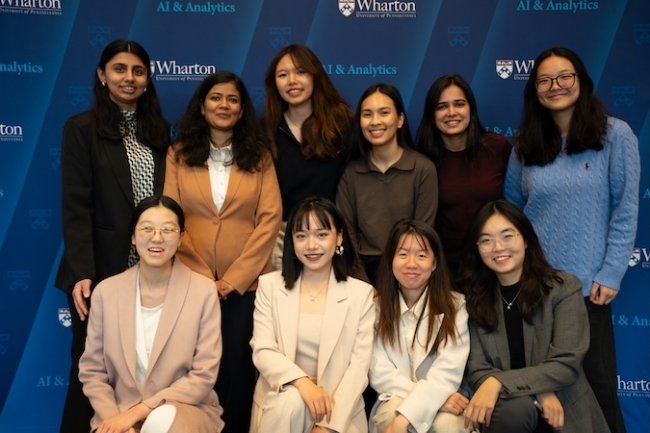Penn GSE teams finish strong at Wharton Hack-AI-thon

(From left, standing): Ruchi Arora, Sakshi Singh, Amanda Tran, Catherine Roeroe, Jyoti Poonia, and Polly Lau, (seated) Xinyue Cui, Shiyang Zhang, Siyun Chen, and Haowei Li on the final day of Wharton Hack-AI-thon 2025 challenge. Photo by Kyle Kearns for the Wharton AI & Analytics Initiative.
Two teams of Penn GSE master’s students made it to the finals of the second annual Wharton Hack-AI-thon, which brought together students in March from across the University to innovate by solving real-world problems with artificial intelligence in just one week.
One team—featuring Learning Sciences and Technologies (LST) students Jyoti Poonia and Catherine Roeroe, Sakshi Singh, Amanda Tran, and Teaching, Learning and Leadership student Ruchi Arora—developed Agora, an AI-powered classroom orchestration tool designed to foster intentional, meaningful dialogue. The other group—featuring LST students Haowei Li, Siyun Chen, Shiyang Zhang, Xinyue Cui, and Penn Engineering student Sen Liu—created Echolearn, a personalized AI companion that helps users deepen their understanding of any study material by prompting them to explain and teach it.
“My learning from this experience has been truly incredible,” said Arora. “One of the most powerful aspects was witnessing how each team member—regardless of background—contributed meaningfully. . . We worked on a real-world challenge, which made the experience even more impactful. It encouraged us to think strategically—not only about the problem at hand, but also about how education might evolve in the future.”
Many of the students learned about Hack-AI-thon in Mamta Shah’s “Artificial Intelligence for Children and Youth” course and were inspired by the prompt— How might we utilize AI to revolutionize education for K-12 or university students?—to participate.
“As someone deeply interested in the intersection of AI and education, I’ve often felt that many AI-powered educational products fall short of being truly effective, research-informed, and responsive to users’ real needs,” said Zhang. “As an arts student, I had never taken part in a competition like this before, so I saw it as a valuable opportunity to step outside my comfort zone and explore what it would be like to design an Edtech product from the ground up. I wanted to understand the challenges and considerations involved in the process, and to see whether we could create something genuinely helpful for learners.”
It seems they could because, Zhang’s Echolearn team was one of two finalists from 15 initial teams in the Prompt Hacking Challenge. And, of the roughly 40 teams competing, the Agora group was one of six finalists in the AI for Education Challenge. The finals were judged by Wharton Lecturer and nine dots CEO Geoffrey Klein, GEP Worldwide President and Co-founder Neha Shah, C’99, W’99, WG’06, Glymer CEO Jeff Greenhouse, W’99, and former partner at KPMG Brian Hughes, W’81, WG’91.
“I saw this as a great opportunity to learn from the judges,” said Chen. “Their feedback helped broaden and deepen my understanding of what it really takes to create an effective AI-based learning solution—both in terms of educational theory and practical value.”
All of the Penn GSE participants felt that the hackathon was a rich learning experience, both for the hands-on practice they got with the technology as well as the inspiration they got from the other teams and their projects.
“The most significant takeaway for me from this experience was how we translated classroom theory into a real-world, AI-driven application,” said Poonia. “I’ve been working on AI-related projects across classes this semester, and it was incredibly meaningful to apply those learnings in this way. I feel more connected to my program than ever, as this truly embodied what Learning Sciences and Technologies is all about.”
